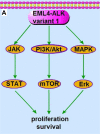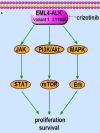ALK and ROS1 as targeted therapy paradigms and clinical implications to overcome crizotinib resistance
- PMID: 26802023
- PMCID: PMC4914285
- DOI: 10.18632/oncotarget.6935
ALK and ROS1 as targeted therapy paradigms and clinical implications to overcome crizotinib resistance
Abstract
During the past decade, more than 10 targetable oncogenic driver genes have been validated in non-small cell lung cancer (NSCLC). Anaplastic lymphoma kinase (ALK) and ROS1 kinase are two new driver genes implicated in ALK- and ROS1-rearranged NSCLC. Inhibition of ALK and ROS1 by crizotinib has been reported to be highly effective and well tolerated in these patients. However, resistance to crizotinib emerges years after treatment, and increasing efforts have been made to overcome this issue. Here, we review the biology of ALK and ROS1 and their roles in cancer progression. We also summarize the ongoing and completed clinical trials validating ALK and ROS1 as targets for cancer treatment. In the last section of the review, we will discuss the molecular mechanisms of crizotinib resistance and focus approaches to overcome it. This review describes an exciting new area of research and may provide new insights for targeted cancer therapies.
Keywords: ROS1 kinase; anaplastic lymphoma kinase; crizotinib; drug resistance; non-small cell lung cancer.
Conflict of interest statement
This review was sponsored by grants from the National Natural Science Foundation of China (#81272518 and #81472192 to Jian Zhang). The authors have no other relevant affiliations or financial involvements with any organization or entity with a financial interest in or a financial conflict with the subject matter or materials discussed in the manuscript.
Figures




References
-
- Morris SW, Kirstein MN, Valentine MB, Dittmer KG, Shapiro DN, Saltman DL, Look AT. Fusion of a kinase gene, ALK, to a nucleolar protein gene, NPM, in non-Hodgkin's lymphoma. Science. 1994;263:1281–4. - PubMed
-
- Elmberger PG, Lozano MD, Weisenburger DD, Sanger W, Chan WC. Transcripts of the npm-alk fusion gene in anaplastic large cell lymphoma, Hodgkin's disease, and reactive lymphoid lesions. Blood. 1995;86:3517–21. - PubMed
-
- Mathew P, Sanger WG, Weisenburger DD, Valentine M, Valentine V, Pickering D, Higgins C, Hess M, Cui X, Srivastava DK, Morris SW. Detection of the t(2;5)(p23;q35) and NPM-ALK fusion in non-Hodgkin's lymphoma by two-color fluorescence in situ hybridization. Blood. 1997;89:1678–85. - PubMed
-
- Soda M, Choi YL, Enomoto M, Takada S, Yamashita Y, Ishikawa S, Fujiwara S, Watanabe H, Kurashina K, Hatanaka H, Bando M, Ohno S, Ishikawa Y, et al. Identification of the transforming EML4-ALK fusion gene in non-small-cell lung cancer. Nature. 2007;448:561–6. - PubMed
-
- Wong DW, Leung EL, So KK, Tam IY, Sihoe AD, Cheng LC, Ho KK, Au JS, Chung LP, Pik Wong M, University of Hong Kong Lung Cancer Study G The EML4-ALK fusion gene is involved in various histologic types of lung cancers from nonsmokers with wild-type EGFR and KRAS. Cancer. 2009;115:1723–33. - PubMed
Publication types
MeSH terms
Substances
LinkOut - more resources
Full Text Sources
Other Literature Sources
Medical
Miscellaneous

